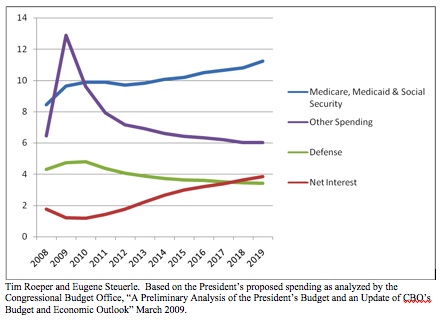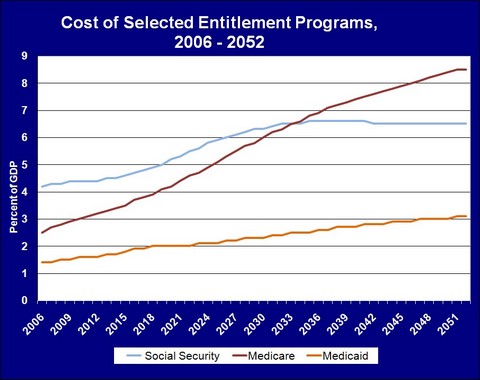Social Security Unfairly Blamed Again for Health Care's Problems
by Craig Jennings, 4/10/2009
In an opinion piece published in Roll Call, Gene Steuerle, vice president of the Peter G. Peterson Foundation, engages in a bit of trickery intended to make long-term Social Security financing appear more dangerous to the long-term fiscal situation than it really is. The premise of the piece -- that Obama's budget is not transformative -- is, I think, spot on. However, Steuerle's enveloping of Social Security into Medicare and Medicaid costs is a classic sleight-of-hand employed by those who would dismantle Social Security as it exists today.
So where is the long-term growth in government headed? Projected growth in Medicare, Medicaid and Social Security—almost all of which goes to the elderly and near elderly — dominates the charts, just as it did under Presidents George W. Bush, Bill Clinton, George H.W. Bush and Ronald Reagan. Of the total projected growth in government spending of 3.5 percent of GDP from 2008 to 2019, these three programs, along with the rising interest costs, would get more than 100 percent. [emphasis mine]

(The chart accompanying Steuerle's Roll Call piece)
I'm not going to call Steuerle dishonest, because, well, he's not. He is, however, very misleading. He is accurate in reporting that Social Security and the health care safety net will consume larger shares of GDP compared to other public spending in the coming years. But, when one disentangles Social Security from the health care components, a different story emerges: Medicare (and actually health care costs generally) is the driver of the long-term fiscal picture. By lumping Social Security in with Medicare and Medicaid and by cutting spending projections off at 2020, when the Social Security expenditure growth rate peaks, Steurele paints a totally misleading picture.
Note in second chart that the slope of the Medicare line is twice as much as that of Social Security's. And crucially, the Medicare line continues to point upward after Social Security's peaks and levels off.
The sort of obfuscations in which Steuerle engages -- indicting Social Security as a co-conspirator -- is intended to produce a policy outcome that is not only irrelevant to fixing the long-term fiscal imbalance but serves to undermine support for a vital and well-designed social safety net.




